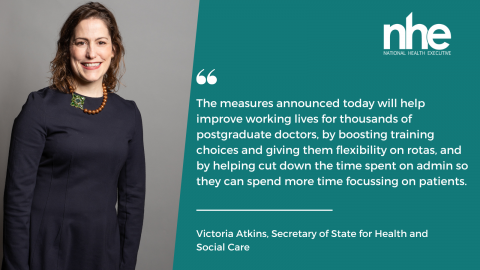NHS England (NHSE) along with the Department of Health and Social Care (DHSC) have set out a wide range of measures to radically improve the lives of postgraduate doctors, as healthcare leaders look to implement the NHS Long Term Workforce Plan ambition to retain more staff.
Postgraduate doctors account for more than 50,000 NHS staff in England and are set to benefit from greater flexibility, less administration and an eased financial burden, as set out in a letter to NHS leaders from Amanda Pritchard, Dr Navina Evans and Professor Sir Stephen Powis.
NHSE is carrying out a review of the minimum legal requirements for statutory and mandatory training, so staff can spend more time with patients. Plans, which include to extend the refresher period between retaking training modules, could give doctors one full day back each year.
The review is expected to be completed by August 2024 and will establish which people are required to complete each module.
Deputy chief executive at NHS Providers, Saffron Cordery, said: “Doctors in training are vital for the future of the NHS and trust leaders know much more needs to be done to improve the working lives of this highly valued group of staff.”

To further alleviate the administrative burden on doctors, NHSE has also said that trusts should adopt a national framework and eLearning online training portal to ensure training is completed and reported.
A Memorandum of Understanding will mean that providers can accept each other’s training – a precursor to the Digital Staff Passport.
While ensuring providers are meeting their requirements to give staff choice and flexibility with rotas, NHSE will also explore the possibility to harness cutting-edge technology to enable better self-rostering.
This is in addition to new payroll guidance, which NHSE says each trust will have in place by the end of July – this is expected to particularly help doctors in training as rotations and education costs can make payroll errors more likely.
Plus, for the employers with the most errors, intensive support will be delivered along with a review and revamp of their payroll processes – if necessary.
“These are important steps to improve the working and educational lives of doctors in training,” said Danny Mortimer, the chief executive at NHS Employers.
We're continuing our work to improve the working conditions of @NHSEngland doctors.
— Department of Health and Social Care (@DHSCgovuk) April 25, 2024
Helping to make the NHS faster, simpler and fairer.
Health and Social Care Secretary @VictoriaAtkins explains how this is just the start 👇 pic.twitter.com/x4QEk2xL80
Lead Employer Models will be explored too, meaning each doctor has a single lead employer throughout their training process to hopefully reduce errors in payroll.
The General Medical Council Survey, along with the National Training and Education Survey, will be treated more similarly to the National Staff Survey – trust boards will oversee a clear action plan, which a named, senior individual will help implement.
Dr Navina Evans, NHSE’s chief workforce, training and education, explained: “It is really important that all NHS staff feel they can manage the demands of work alongside their lives outside of work”.
The way in which staff pay course fees will be reversed as well, so the NHS pays them upfront – rather than vice-versa which can cause hardship when waiting for reimbursement.
NHSE’s chief executive, Amanda Pritchard, said: “Some of these are immediate actions which trusts should make sure are happening right away, while other are longer term measures which we are making a priority – we want our skilled doctors to stay working in the NHS and have rewarding careers – and I am committed to making these important changes.”
Image credit: iStock



















